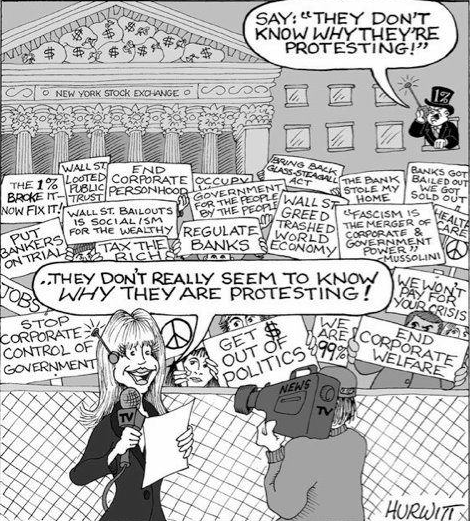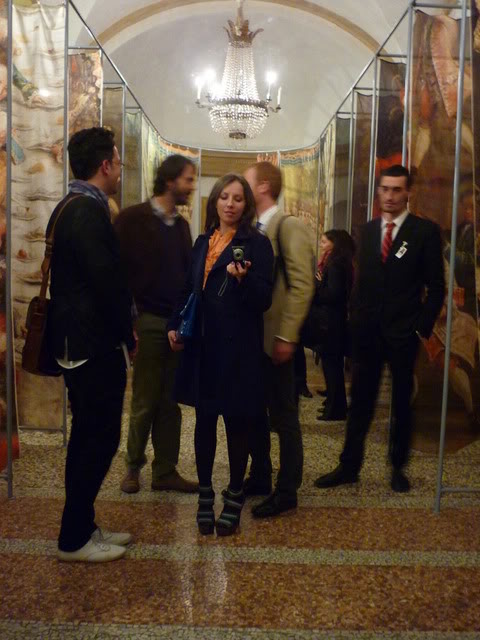
I've been following every twist and turn of the Occupy LSX movement on Twitter and in the news since the protesters first marched to Paternoster Square and ended up outside St Paul's nearly two weeks ago. But I hadn't actually been down to the camp until last night. Media coverage skews to make news and since pretty much every major industry that controls or regulates public life - banking, politics, media, policing, law - is consistently shown to be corrupt and self-serving, before I'd even set foot on the camp, my sympathies were with the protesters.
Despite the fact that I haven't pitched a tent at St Paul's I certainly side with those who believe the system as it stands is in need of some serious reform. The single most astonishing thing to me is that people defend, often aggressively, the same system that screws them over. The "yes, we bailed the banks out, but at least people didn't lose their savings, now deal with it" argument twists my brain in knots. The "yes, our politicians are corrupt and the energy companies are trying to fuck us over, but I pay my taxes, so should the protesters" argument baffles even more.
Not that I think everything is peachy with the Occupy LSX camp. Their "occupy first, demands later" position is problematic, if intellectually compelling. If you've been to the camp, seen how the working groups and the general assembly operate, you'll know why there aren't yet any demands. While nearly all the protesters agree that the banking crisis and corporate greed are the touchstones of the occupy movement, each individual has a different spin: it's the environment, stupid; wait, but isn't it also student tuition fees; are we reverse-capitalists or anti-capitalists; who cares, we must save the NHS! Here's the million-dollar question: when your house is burning down, which kid do you save first?
But while the occupiers shouldn't be mocked for taking the time to think about what it is that they actually want to say and how they want to say it, it's depressing that the conversations on Newsnight and Radio 4 have been about whether the protesters actually sleep in their tents at night or whether St Paul's really closed its doors because of health and safety violations, and not about raising the 'margin rate' charged to speculators or calling time on fractional reserve banking. Yes, there are a lot of people throwing about a lot of meaningless Hallmark-card style platitudes about loving thy neighbour and doing what Jesus would do on Twitter. But, if you actually go down to OccupyLSX and listen there are plenty of people discussing complex economic and political issues.
While at times I wanted to smack my forehead in annoyance with the obsession with process, process, process (the lethargy and mediocrity of the general assembly and the smaller working groups did, in truth, remind me rather of the lethargy and mediocrity of government itself), I was struck by the dynamics of a system where everyone gets a say. There are a few stronger personalities evident, which probably helps keep people focused, but I felt a sense of urgency was lacking. The protesters are all incredibly media savvy and aware of what's being said about the movement in the papers to the point that it feels a bit like the day-to-day maintenance is of responding to statements made by the press and others, not themselves setting the agenda for discussion.
If the City really is looking to take out an injunction against the camp, then despite what the occupiers say about being there until Christmas or longer, who knows how long they will actually be able to remain before being booted out by riot police and tear gas. Yet, within the camp there's no consensus on any urgent need to get a message out (though there were a few people trying to kick it up a gear so a statement of intent could be released in time for the G20). If the occupiers felt that the threat of removal by force was imminent, I wonder whether there might be less focus on organising lectures and meditation classes and more time spent on actually getting a strong message across to the people of this country. I don't agree that the most important thing for the movement right now is to be in and controlling public space. Maybe in America where being out en masse out in the open in public space is actually a really big deal in cities where people are never out in public together, but there have been people occupying Parliament Square for years and no one pays any attention to them anymore.
My guess is that there are a lot of people watching in the wings, waiting to see what the Occupy LSX movement does, wanting desperately for the protesters to say something that they can get behind. Because, yes, we all know that the system is screwed and that the bankers got a lucky break and that we shouldn't socialise banks but privatise profit and that Dave "greasy-hands" Hartnett shouldn't be able to sign off sweetheart tax deals and that one too many politicians, journalists and coppers are corrupt, but generic statements don't move the movement forward. Generic statements are elevator music and we're sick of holding the line.
Getting the public on their side is what Occupy LSX really needs. Most people reading this will know that the fear and misinformation propagated via many news outlets divides and that it divides on purpose. We, the 99% (to use a phrase I don't entirely agree with), don't have political power. Our power lies in the fact that there are so damned many of us, we have power in numbers. How to harness this power, I have no idea, but if the Occupy movement in London is going to gather momentum and not deflate, it needs to figure out how to get ordinary, disaffected people on its side, instead of alienating them to the point that they defend those who screw them in the hope that they may someday be those doing the screwing.
So, while not everything I saw at the Occupy LSX camp made me weep with joy, I felt plugged in, excited and hopeful that what they were doing could potentially affect change. I want very much for the protesters to gain ground, but I hope that ground is gained on points more important than whether the infrared technology that spied on their tents was or was not inaccurate. I hope they find a way to get people to pay attention because their broader points about social and economic injustice are a lot more important than what's happening on the X-Factor. There are plenty of bright minds and passionate people working at Occupy London, but it's time to turn that passion into something more. As the protesters have pointed out, no one will be able to appropriate and misconstrue their demands if they haven't made them public; equally no one will join a cause if they don't know what it's trying to achieve.



Images used under Creative Commons License. Credits: Hedonoikos, christopher a tittle, Loz Flowers and Hurwiti.




1 comment:
You are right media is controlled by the power that hold control of the country. So news instead of inform. They do the other way around.
Post a Comment